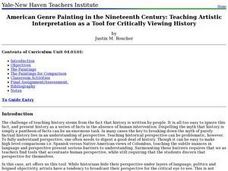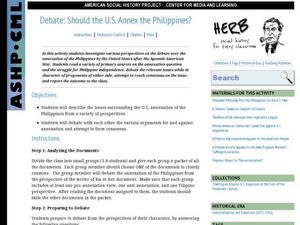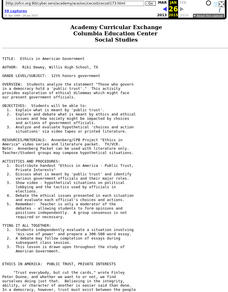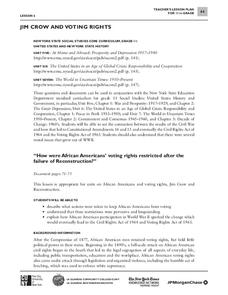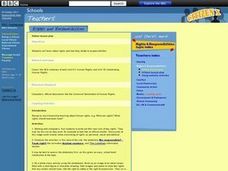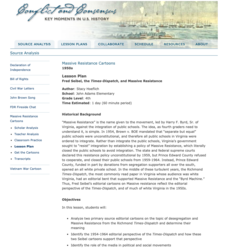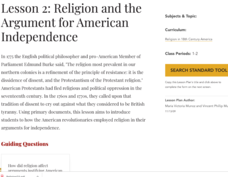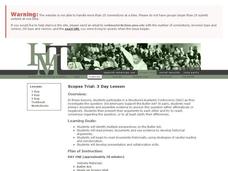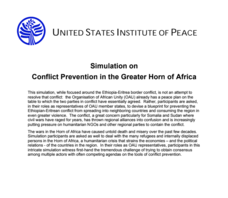Curated OER
American Genre Painting in the Nineteenth Century: Teaching Artistic Interpretation as a Tool for Critically Viewing History
Students view a variety of artwork to determine the history and lifestyle of people from New Haven, Connecticut. In groups, they develop their individual hypothesis about why the paintings were created and share them with their group...
Curated OER
Confict, Consensus, and Conclusion
Students debate the key issues dealing with women's rights and the rights of African Americans during and after the Civil War. They analyze the women's rights movement in relationship to the desire for suffrage. They utilize the...
Curated OER
Samuel's Choice
The book, Samuel's Choice is used to illustrate the decisions that African Americans who were enslaved during the Revolutionary War had to make. The series of four lessons is designed to be implemented after the book is read. The book,...
Curated OER
Debate: Should the U.S. Annex the Philippines?
Building an argument with supporting evidence is a vital skill. Learners engage in a debate over the annexation of the Philippines after the Spanish-American War. They take on the perspective of an individual from that time period,...
iCivics
We the Jury
Learners take on the roles of jurors in a civil case to evaluate evidence and determine a verdict in this engaging online interactive experience.
Curated OER
Ethics in American Government
Engage 12th graders in a series of activities focused on public trust and ethics in US Government. They view a series of videos, hold a class debate, and compose a short essay. Note: Suggested videos are listed but are not available...
City University of New York
Jim Crow and Voting Rights
Class groups examine primary source documents to determine how the voting rights of African Americans were restricted after the failure of Reconstruction, and how African American participation in World War II lead to change.
BBC
Rights and Responsibilities - Part 2
Citizenship and basic human rights are the focus of the lesson presented here. In it, learners compile a basic list of human rights, then access a website in order to complete some activities that are based on rights and...
The New York Times
Revolt! Comparing Historical Revolutions
What elements are needed to have a revolution? How do historical revolutions from across the globe and generations compare with one another? This is an excellent activity that incorporates group work, source analysis, and an engaging...
National Endowment for the Humanities
A Journalist’s Report: The Better Vision for Black Americans
After reading a series of primary source documents detailing the teachings of Martin Luther King, Jr. and Malcolm X, class members craft newspaper columns assessing the strengths and weaknesses of each man's vision, and present their...
Reading Through History
Patriots and Loyalists
Patriots versus Loyalists, a huge divide during the Revolutionary War in what would become the United States of America. An informative resource includes both direct instruction about the two groups and a quiz pupils take after reading...
Jamestown-Yorktown Foundation
Why Did Some Colonial Virginians Continue to Support the King?
Not all colonials supported the American Revolution. A resource from the American Revolution Museum at Yorktown ask young historians to investigate the reasons why some colonial Virginians were loyalist and continued to support King...
Ford's Theatre
How Perspective Shapes Understanding of History
The Boston Massacre may be an iconic event in American history, but perhaps the British soldiers had another point of view. Using primary sources, including reports from Boston newspapers and secondary sources from the British...
Roy Rosenzweig Center for History and New Media
Fred Seibel, the Times-Dispatch, and Massive Resistance
A instructional activity challenges scholars to analyze editorial cartoons created by Fred Seibel, illustrator for the Times-Dispatch, during the Massive Resistance. A class discussion looking at today's editorial pages and Jim Crow Laws...
Curated OER
The Vernors Lesson
Students fill out "Effects of the Civil War" question and answer sheet and discover that Vernors was created as a direct result of the Civil War.
Curated OER
A House Dividing: The Growing Crisis of Sectionalism in Antebellum America
Young scholars explore the debates over American slavery and the power of the American federal government for the first half of the 19th century and how the regional economies and political events produced a widening split between the...
National Endowment for the Humanities
Lesson 2: Religion and the Argument for American Independence
Young scholars examine how religion affected arguments justifying American independence. They read and analyze primary source documents, and write an essay analyzing how Americans used religious arguments to justify revolution against a...
Curated OER
The Two-Party System: Chapter 5
Guide your students' reading with this worksheet. Included are five matching and five multiple choice questions focused on aspects of the two-party system employed in the United States. Use as a quiz, guided reading questions, or homework.
Historical Thinking Matters
Scopes Trial: 3 Day Lesson
Was the Scopes trial more complicated than a simple debate between evolutionists and creationists? As part of a structured academic controversy (SAC) activity, pupils consider multiple perspectives of the Butler Act and engage in close...
Learning to Live
Attributes of a Civil Society
What makes a society civil? High school freshmen search for examples of justice, kindness, peace, and tolerance in news media and brainstorm how they can promote these attributes in their schools, communities, and world. The well-rounded...
PBS
An Attack on Syria- What Would You Do?
Has United States military intervention in the conflicts of other countries always been warranted? After reviewing a brief background on contemporary US conflicts and reading articles describing the civil war in Syria, your learners...
US Institute of Peace
Simulation on Conflict Prevention in the Greater Horn of Africa
Is containing a conflict possible in the Horn of Africa? Young peacekeepers engage in a simulation that examines the multi-faceted conflict that exists between the countries of Ethiopia and Eritrea. Representatives from ten countries in...
Curated OER
Samuel's Choice - Social Studies Using Children's Literature
Fifth graders read a book about independence, freedom, and slavery. Students create a story map of the book. They research the causes of the Civil War. Students write a newspaper article from the point of view of an American colonist.
Curated OER
Social Studies: Aztec Calendars and Culture
Sixth graders analyze the Aztec calendar and create their own examples of them. They determine the meaning of the symbols used in the calendars and record their ideas in journals. Students host a parent breakfast for them to observe...


